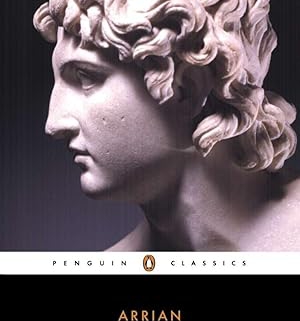10 Best Books On Alexander The Great: An Extended Exploration Through Essential Literature
Introduction: The Undying Fascination with Alexander the Great
10 Best Books On Alexander The Great – Alexander III of Macedon, universally and perhaps controversially dubbed “Alexander the Great,” stands as a colossus of the ancient world, a figure whose life story is so extraordinary it often reads like myth. Born into royalty in 356 BC, within little more than a decade he would lead his armies from the relatively obscure kingdom of Macedon across three continents, forging an empire that stretched from Greece to the borders of India. His military genius, unparalleled ambition, and the sheer audacity of his campaigns irrevocably altered the course of history, spreading Greek culture, language, and influence across vast new territories and ushering in the Hellenistic Age.
Yet, Alexander was far more than just a conqueror. He was a student of the renowned philosopher Aristotle, demonstrating a keen intellect and a lifelong curiosity about the world he was rapidly conquering. He founded cities that became centers of learning and commerce, married into foreign royal families, and wrestled with the immense challenges of governing a vast and diverse empire. His personality was a complex blend of visionary leadership, immense courage, intellectual curiosity, and, at times, ruthless cruelty, explosive temper, and potentially destructive paranoia. This intricate mix of admirable qualities and significant flaws is part of what makes him such an enduring subject of study and fascination.
Given the magnitude of his impact and the complexity of his character, it is unsurprising that an immense body of literature has been dedicated to understanding Alexander the Great. From the ancient historians who wrote relatively soon after his death, drawing on now-lost eyewitness accounts, to contemporary scholars who meticulously sift through evidence and offer new interpretations, the books on Alexander provide a window into his world and his mind. This guide presents **10 essential books**, carefully selected to offer a range of perspectives – from military history and biography to cultural analysis and critical re-evaluation. Engaging with these works is crucial for anyone seeking a comprehensive understanding of Alexander’s triumphs, his controversies, and the multifaceted legacy that continues to resonate across millennia.
10 Best Books On Alexander The Great
1. The Campaigns of Alexander by Arrian
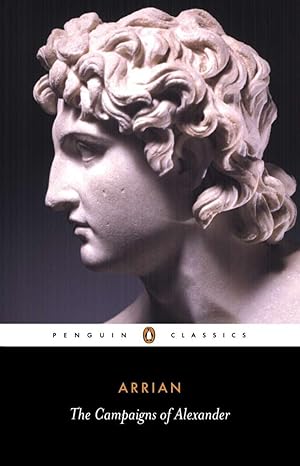
Why Read It? The Cornerstone Ancient Military History
For serious students of Alexander, Arrian’s work is arguably the most important surviving ancient historical account, particularly for understanding the practicalities and progression of his military campaigns. While other ancient sources offer different angles, Arrian is generally considered the most structured and reliable in terms of providing a chronological narrative of Alexander’s military movements and major battles. It serves as a foundational text that later historical analyses often build upon or contrast with.
Synopsis: A Focus on Strategy and Execution
Flavius Arrianus (c. 86 – c. 160 AD), a Greek historian who held high office in the Roman Empire (including serving as a Roman consul and governor), wrote his history centuries after Alexander, but critically, he based his work primarily on the accounts of individuals who were actually present during the campaigns. His two main sources were Ptolemy I Soter, one of Alexander’s most trusted generals who later became king of Egypt, and Aristobulus of Cassandreia, another companion who served Alexander for many years. Both men wrote memoirs that are now lost to us, making Arrian’s synthesis invaluable. Arrian’s background as a military commander likely influenced his approach, leading him to focus with precision on military strategy, logistics, and tactics. He meticulously details Alexander’s use of the formidable Macedonian phalanx, the devastating effectiveness of his Companion Cavalry, and his innovative siege techniques. While he records the events faithfully according to his sources, Arrian’s portrayal of Alexander tends to be largely positive, emphasizing his strategic brilliance and personal bravery on the battlefield. He often glosses over or omits some of the more controversial or negative aspects of Alexander’s behavior and decisions, such as the widespread destruction or acts of cruelty that other ancient authors highlight.
Sneak Peek: Immersive Battle Narratives and Glimpses of Character
Arrian’s strength lies in his vivid and clear descriptions of the major military engagements. His accounts of battles like the Granicus River, Issus, and especially the climactic Battle of Gaugamela (331 BC) are considered essential reading for understanding ancient warfare. In his description of Gaugamela, Arrian details Alexander’s daring plan to draw the Persian cavalry out, create a gap in their lines, and then lead a direct cavalry charge towards Darius III himself – a high-stakes maneuver that demonstrated Alexander’s tactical genius and his willingness to put himself in personal danger. Beyond the battlefield, Arrian also includes anecdotes that reveal aspects of Alexander’s intellectual curiosity and interactions with significant figures. His recording of the famous meeting between Alexander and the Cynic philosopher Diogenes in Corinth, where Diogenes famously asked Alexander only to stop blocking his sun, provides a memorable (though potentially embellished) glimpse into Alexander’s respect for philosophical independence and his own contemplative side, showing that his interests extended beyond military conquest.
2. The History of Alexander by Quintus Curtius Rufus
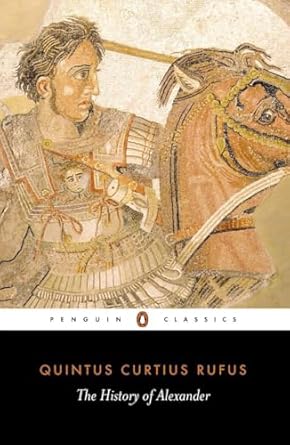
Why Read It? A Dramatic and Critical Roman Perspective
Offering a stark contrast to Arrian’s more restrained account, Curtius Rufus provides a much more dramatic, character-driven, and morally charged narrative of Alexander’s life. Writing for a Roman audience interested in rhetoric, morality, and the excesses of power, his work delves into court intrigue, personal flaws, and the potentially corrupting influence of absolute authority. It’s valuable for presenting a less idealized view and exploring the human drama surrounding Alexander.
Synopsis: Intrigues, Excesses, and Moral Decline
Quintus Curtius Rufus, who likely wrote during the 1st century AD under the Roman Empire, drew upon different Greek sources than Arrian, including some that presented a more critical view of Alexander (known as the ‘vulgate’ tradition). While sections of his work are unfortunately missing, the surviving books cover key periods of Alexander’s campaigns and his later years. Curtius Rufus shows a greater interest in the internal dynamics of Alexander’s court, the growing tensions between Alexander and his Macedonian officers, and the psychological impact of power and success on the king. He focuses on events that illustrate Alexander’s changing character, particularly his gradual adoption of Persian customs and traditions, which caused considerable resentment and alienation among his traditional Macedonian followers. Crucially, Curtius Rufus does not shy away from depicting Alexander’s negative traits and actions. He provides vivid and often sensational accounts of incidents like Alexander’s drunken murder of Cleitus the Black, a deeply controversial act that shocked his army, and the politically charged destruction of the magnificent palace complex at Persepolis. His narrative tends to frame these events within a moralistic framework, exploring the theme of how power corrupts and leads to a ruler’s downfall or moral decay.
Sneak Peek: Cinematic Sieges and High Drama
Curtius Rufus is renowned for his ability to bring historical events to life with a strong sense of drama and intensity, almost like a script for a historical epic. His description of the Siege of Tyre (332 BC) is a prime example of his narrative style. He recounts not only the incredible feat of engineering required to build the massive mole across the sea to attack the well-defended island city but also the ferocity of the fighting, the high stakes for both sides, and Alexander’s relentless determination to overcome this formidable obstacle. The narrative underscores Alexander’s ingenuity and perseverance but also highlights the immense cost and brutality of his campaigns. Furthermore, Curtius Rufus provides detailed accounts of the internal dissent and conspiracies within Alexander’s court, giving readers a sense of the tense and often dangerous atmosphere that surrounded the increasingly isolated king in his later years, offering a stark contrast to the image of a universally beloved leader.
3. Life of Alexander the Great by Plutarch
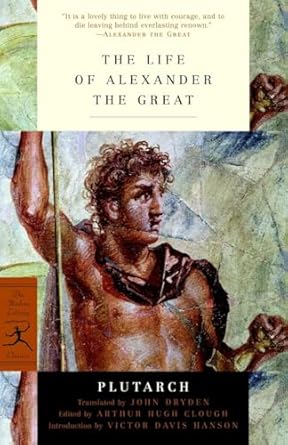
Why Read It? Character Study and Enduring Anecdotes
Plutarch’s biography offers less of a chronological history of campaigns and more of a moral and psychological portrait of Alexander. As part of his “Parallel Lives,” Plutarch sought to illuminate character through anecdote, making his work invaluable for its collection of stories, both historical and legendary, that have shaped the popular image of Alexander for centuries. It provides insights into how his personality and actions were perceived and interpreted in the ancient world.
Synopsis: Virtues, Vices, and Illustrative Stories
Plutarch of Chaeronea (c. 46 – c. 120 AD) was a Greek biographer, essayist, and philosopher whose “Parallel Lives” paired famous Greeks and Romans to explore their characters and the moral lessons their lives offered. His biography of Alexander, paired with that of Julius Caesar, is one of the most widely read ancient accounts. Plutarch draws on a variety of earlier sources, including some that are now lost, and his interest lies primarily in revealing Alexander’s character through illustrative stories and episodes. He presents a balanced view, highlighting Alexander’s many virtues – his immense personal courage, his intellectual curiosity (nurtured by his education), his charismatic leadership, and his moments of generosity – while also candidly discussing his significant vices, such as his infamous temper, his susceptibility to flattery, his increasing arrogance (hubris), and his struggles with alcohol, which often led to regrettable actions. The text is filled with famous anecdotes, some historically verifiable, others potentially embellished or legendary, that serve to illuminate these character traits. These include the story of how the young Alexander tamed the wild horse Bucephalus, descriptions of his physical appearance and the legendary sweet scent attributed to him, and the various accounts of his final words on his deathbed.
Sneak Peek: The Impact of Aristotle and Legendary Moments
Plutarch provides one of the most detailed and engaging accounts of Alexander’s formative education under the guidance of Aristotle in the serene setting of Mieza. He describes how Aristotle instilled in Alexander a deep love for learning, particularly for philosophy, medicine, and literature, with Homer’s epics reportedly being a constant companion. This intellectual foundation undoubtedly influenced Alexander’s policies, such as his patronage of science and exploration, his respect for certain aspects of conquered cultures, and his practice of taking scholars and scientists on his campaigns. Plutarch also recounts many of the most famous stories associated with Alexander that have captured the popular imagination, including the tale of the Gordian Knot (though he presents a slightly different version than some) and the iconic meeting with Diogenes the Cynic. These anecdotes, regardless of their absolute historical accuracy, reveal how Alexander’s contemporaries and near-contemporaries sought to understand and portray his unique personality and his place in the world.
4. Alexander the Great by Robin Lane Fox
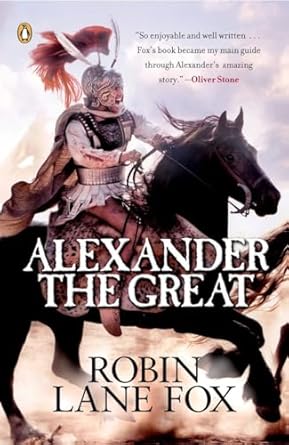
Why Read It? The Benchmark Modern Scholarly Biography
Often cited as the definitive modern biography, Robin Lane Fox’s work stands out for its exceptional blend of meticulous historical research, critical evaluation of ancient sources, and compelling narrative writing. It synthesizes decades of scholarship into a comprehensive and engaging account that is accessible to general readers while meeting the highest academic standards. For many, this is the essential starting point for a deep dive into Alexander from a contemporary historical perspective.
Synopsis: From Philip’s Heir to Emperor of the East
Robin Lane Fox is a highly distinguished historian of the ancient world, and his biography of Alexander, first published in 1973 but subsequently updated, reflects extensive research and a deep understanding of the classical world. The book traces Alexander’s entire life trajectory in detail, beginning with the complex political environment of Macedon and the fraught relationship between Alexander and his brilliant but volatile father, Philip II, who transformed Macedon into a dominant power. Lane Fox meticulously recounts Alexander’s campaigns across Asia Minor, his conquest of Egypt, his overthrow of the vast Persian Empire, and his push eastward into India. He carefully evaluates the often conflicting accounts of the ancient sources, providing a balanced and critical perspective. A key strength of the book is its ability to contextualize Alexander’s actions within the political, military, and cultural realities of the 4th century BC. Lane Fox actively addresses and often debunks popular myths and legends that have accumulated around Alexander, presenting a more historically grounded figure. He also explores Alexander’s complex and sometimes controversial vision for his empire, including his policies aimed at integrating Greek and Persian elites and fostering cultural fusion, analyzing the motivations and consequences of these ambitious initiatives.
Sneak Peek: Strategic Mastery and Cultural Ambition
Lane Fox’s analysis of Alexander’s military campaigns is particularly insightful, offering clear explanations of his strategies and tactics. His detailed account of the Battle of Issus (333 BC), where Alexander faced the main Persian army led by King Darius III in a relatively confined coastal plain, illustrates Alexander’s tactical adaptability and daring. Lane Fox shows how Alexander recognized the limitations the terrain imposed on the larger Persian force and seized the opportunity to personally lead his cavalry in a decisive charge directly towards Darius’s position, aiming to break the enemy’s command and control and cause panic. Beyond military matters, Lane Fox also delves into the fascinating cultural aspects of Alexander’s rule, such as the mass marriage ceremony at Susa (324 BC), where thousands of Macedonian soldiers were married to Asian women, and Alexander himself married two Persian princesses. Lane Fox analyzes this controversial event as a deliberate attempt by Alexander to create a new Greco-Persian ruling class and foster unity within his diverse empire, even if it was met with resistance from his Macedonian veterans.
5. Alexander the Great: The Hunt for a New Past by Paul Cartledge
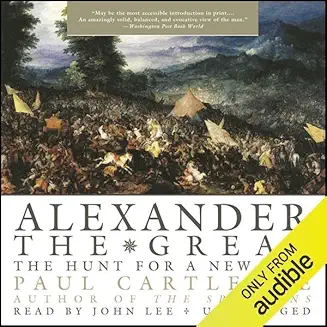
Why Read It? A Provocative and Essential Critical Reassessment
Paul Cartledge’s work is crucial for providing a necessary counterpoint to more celebratory narratives of Alexander. He challenges readers to look critically at Alexander’s actions and motivations, questioning the traditional image of the benevolent civilizer and highlighting the brutality and self-interest inherent in his conquests. This book is vital for developing a balanced and ethically informed understanding of Alexander’s legacy.
Synopsis: Ambition, Brutality, and Questioning “Greatness”
Paul Cartledge is a leading historian of ancient Greece known for his incisive analysis and willingness to challenge conventional wisdom. In this book, Cartledge undertakes a deliberate “hunt for a new past” for Alexander, moving away from romanticized interpretations. He argues forcefully that Alexander’s primary motivation was personal glory (kleos) and the continuation of his father’s expansionist project, rather than any altruistic mission to spread Greek culture or civilize the world. Cartledge meticulously examines the ancient sources to highlight the darker aspects of Alexander’s reign, focusing on instances of cruelty, ruthlessness, and the immense violence inflicted upon conquered populations. He provides a detailed account of the destruction of Thebes (335 BC), where Alexander utterly destroyed the ancient Greek city and enslaved its inhabitants as a brutal example to deter other potential rebellions. Cartledge directly confronts the concept of Alexander’s “greatness,” asking whether such a term is appropriate for a figure responsible for so much destruction and loss of life when viewed from the perspective of the conquered peoples and through the ethical lens of later history. He frames Alexander’s actions within the broader historical phenomenon of ancient imperialism and colonialism, highlighting the inherent violence and subjugation involved.
Sneak Peek: Political Pragmatism and the Cost of Empire
Cartledge’s critical approach is evident in his analysis of Alexander’s interactions with the diverse peoples and regions of his empire. His discussion of Alexander’s campaigns in Bactria and Sogdiana (modern Afghanistan and parts of Central Asia) goes beyond military accounts to explore the political complexities of controlling these fiercely independent territories. Cartledge analyzes Alexander’s strategic marriage to Roxane, the daughter of a powerful local Bactrian chieftain. While often depicted romantically, Cartledge emphasizes that this alliance was a pragmatic political maneuver essential for securing a difficult region and integrating local elites into his rule. This analysis underscores Cartledge’s focus on the hard-nosed political realities that underpinned Alexander’s actions, demonstrating that his decisions were often driven by necessity and the demands of maintaining control over a vast and disparate empire, highlighting the political costs and compromises inherent in his ambitious project.
6. Alexander of Macedon by Peter Green
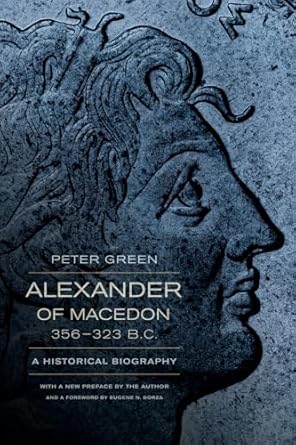
Why Read It? A Psychological and Humanistic Journey
Peter Green’s biography offers a compelling and deeply humanistic portrayal of Alexander, delving into the psychological factors that may have driven him and exploring the personal cost of his relentless ambition. With his background as both a historian and a novelist, Green is particularly skilled at bringing Alexander and his world to life, providing insights into his inner life and the emotional landscape of his campaigns. It’s valuable for readers interested in the man behind the legend.
Synopsis: Homeric Heroes, Father Issues, and Human Frailty
Peter Green is a classical scholar known for his insightful and often psychologically driven historical writing. His biography of Alexander explores the complex motivations that fueled the king’s extraordinary career. Green delves into Alexander’s relationship with his father, Philip II, suggesting a dynamic marked by rivalry and a constant drive to surpass Philip’s immense achievements. He also highlights Alexander’s deep and abiding connection to Homeric epic, particularly his identification with Achilles, seeing Alexander’s relentless pursuit of glory and willingness to face death as an emulation of the Homeric hero’s values. Green doesn’t shy away from Alexander’s flaws, providing a nuanced picture of a man driven by immense ambition but also subject to human frailties. Furthermore, Green offers a critical assessment of Alexander’s military and logistical decisions, pointing out instances where ambition may have overshadowed practicality. He provides a detailed and moving account of the devastating march through the Gedrosian Desert (325 BC), a strategic miscalculation that led to horrific suffering and immense loss of life for thousands of his soldiers and camp followers, underscoring the often brutal consequences of Alexander’s relentless drive.
Sneak Peek: Loyalty, Loss, and the Toll of War
Green’s narrative often focuses on the personal bonds and emotional experiences within Alexander’s world. His description of the campaigns in India, particularly the difficult Battle of the Hydaspes River against King Porus and his war elephants, vividly portrays the challenges faced by Alexander’s army. A particularly poignant moment in Green’s account, reflecting his humanistic approach, is the death of Alexander’s famous horse, Bucephalus, after the Battle of the Hydaspes. Green emphasizes this event to highlight the deep emotional connection Alexander had with his loyal steed, who had carried him through nearly every major battle. Bucephalus’s death serves as a powerful symbol of the cumulative toll of years of relentless warfare, not just on the soldiers but also on Alexander himself, illustrating the personal losses embedded within the grand narrative of conquest.
7. The Nature of Alexander by Mary Renault
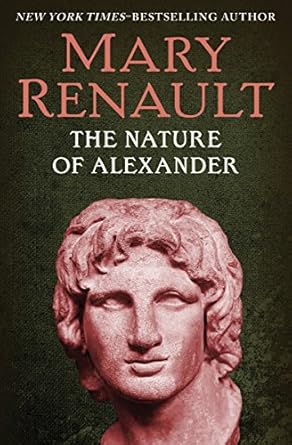
Why Read It? An Empathic Look at Relationships and Culture
Mary Renault, best known for her acclaimed historical novels set in ancient Greece, brings a unique blend of scholarly insight and narrative empathy to this non-fiction analysis of Alexander. Her work is particularly strong in its exploration of Alexander’s key relationships – with his companions, his family, and the people he conquered – and his approach to cultural integration. It offers a deeply humanistic perspective informed by a profound understanding of ancient Greek social dynamics.
Synopsis: Bonds, Marriages, and Cultural Synthesis
Mary Renault (1903-1983) was a British author whose historical novels are celebrated for their accuracy and vivid portrayal of the ancient world. In “The Nature of Alexander,” she turns her scholarly attention to the king, providing an insightful analysis of his character and the dynamics of his most important relationships. She explores in depth his lifelong, devoted bond with Hephaestion, his closest friend and second-in-command, analyzing it within the context of ancient Greek pederasty and the societal acceptance of intense male bonds, pushing back against anachronistic modern interpretations. She also examines his politically motivated marriage to Roxane, the Bactrian princess, and his interactions with other key figures in his life, including his mother Olympias and his various generals. Renault is a keen observer of cultural interactions and offers a nuanced defense of Alexander’s controversial policies aimed at integrating Greek and Persian cultures, such as his adoption of Persian dress and court etiquette. She argues that these were not signs of ‘oriental corruption’ or megalomania but rather pragmatic attempts to create a unified ruling class and foster stability within his vast, multi-cultural empire, reflecting a forward-thinking approach to governance.
Sneak Peek: Divine Claims and Personal Connections
Renault’s narrative style often brings a sense of immediacy and personal connection to historical events. Her account of Alexander’s journey to the Oracle of Zeus-Ammon at the Siwa Oasis in Egypt (331 BC) is a compelling example. She describes the arduous trip to the remote oasis and Alexander’s meeting with the oracle, where he reportedly received some form of divine affirmation, possibly being hailed as the son of Zeus-Ammon (the Egyptian equivalent of Zeus). Renault explores the political significance of this visit, arguing that Alexander shrewdly used this consultation with a respected oracle to legitimize his rule over Egypt and enhance his image as a divinely favored leader, a crucial tool in consolidating his power in a newly conquered land. Furthermore, throughout the book, Renault weaves in details about Alexander’s personal interactions and his relationships with his soldiers and companions, offering a more intimate look at the human side of the legendary conqueror, emphasizing loyalty, friendship, and the shared experiences of years on campaign.
8. In the Footsteps of Alexander the Great by Michael Wood
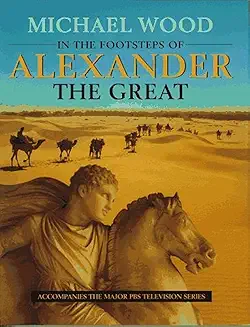
Why Read It? An Immersive Historical Travelogue
Based on the highly acclaimed BBC documentary series, Michael Wood’s book offers a unique perspective on Alexander by physically retracing his epic journey across thousands of miles and multiple continents. It provides a tangible connection to the geography of Alexander’s conquests, blending historical narrative with the author’s experiences and observations in the modern-day landscapes that witnessed Alexander’s passage. This book is perfect for readers interested in the intersection of history, geography, and travel.
Synopsis: Following the Path of Conquest from Greece to India
Michael Wood, a renowned historian and broadcaster, embarked on an ambitious project to literally follow the trail of Alexander’s campaigns from his starting point in Macedon (modern Greece) all the way to the easternmost extent of his empire in India. The book chronicles this extensive journey, covering over 22,000 miles through diverse countries including Turkey, Syria, Egypt, Iraq, Iran, Afghanistan, Uzbekistan, Tajikistan, Pakistan, and India. Wood skillfully combines historical accounts of Alexander’s activities at various locations with his own experiences of traveling through these regions today. He visits major archaeological sites directly associated with Alexander, such as the ruins of ancient cities like Pella and Aigai (in Macedon), the battlefields, the remains of cities Alexander founded (most famously Alexandria in Egypt), and significant cultural centers like Persepolis in Iran. The book is richly illustrated with stunning photographs that capture both the ancient ruins and the vibrant contemporary cultures. Wood also includes fascinating accounts of his interactions with local people along the route, highlighting how memories and legends of Alexander the Great have persisted in the folklore and traditions of these diverse communities over more than two millennia, demonstrating the deep cultural impact of his conquests.
Sneak Peek: Landscapes of Legend and Enduring Legacies
Wood’s journey provides readers with a powerful sense of the scale, diversity, and challenges of the terrain that Alexander and his army traversed. His passages through iconic historical landscapes, such as crossing the Hellespont from Europe to Asia Minor or navigating the rugged mountains and passes of modern-day Afghanistan and Pakistan, offer valuable insights into the logistical difficulties of Alexander’s campaigns. His visit to the legendary Khyber Pass, a crucial gateway between Central and South Asia, allows him to reflect on its enduring strategic importance throughout history. Wood explores how Alexander’s military techniques for campaigning in such challenging mountainous environments may have influenced subsequent military leaders and armies who used similar routes, from medieval conquerors like Genghis Khan to the armies of the British Empire during their colonial expansion in the 19th century. This illustrates how Alexander’s military innovations had a long-lasting impact on the history of warfare and shaped the strategic importance of these regions for centuries to come.
9. Conquest and Empire: The Reign of Alexander the Great by A. B. Bosworth
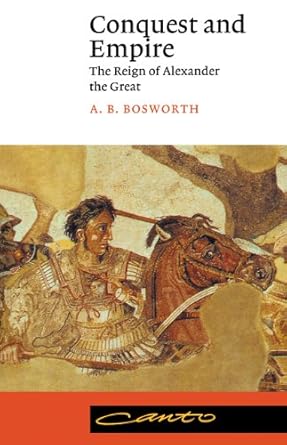
Why Read It? A Rigorous Scholarly Analysis of Power and Governance
A. B. Bosworth’s work is considered a cornerstone of modern academic scholarship on Alexander the Great, offering a detailed, critical, and authoritative analysis that goes beyond narrative to examine the practicalities of power, military logistics, and administration in Alexander’s vast empire. Bosworth is known for his meticulous source criticism and his often skeptical view of Alexander’s long-term planning, making this book essential for those seeking a deeper, more analytical understanding of his reign and its consequences.
Synopsis: Military Machine Meets Administrative Chaos?
A. B. Bosworth is one of the most respected and influential contemporary historians of Alexander the Great, known for his detailed knowledge of the ancient sources and his sharp analytical mind. In “Conquest and Empire,” Bosworth provides a comprehensive scholarly examination of Alexander’s reign, focusing not just on the military campaigns but also on the administrative and political challenges of governing the enormous territory he conquered. Bosworth often presents a critical assessment of Alexander’s governance, arguing that despite his military brilliance, he failed to establish stable and enduring administrative structures or a clear plan for succession, leading to the rapid disintegration of his empire after his death. The book meticulously examines Alexander’s military organization, his strategies for maintaining control over diverse populations, his financial administration (including the management of immense wealth from conquered treasuries), and the complex political dynamics between Alexander, his Macedonian veterans, and the newly incorporated elites. Bosworth provides a thorough and insightful account of the tumultuous period immediately following Alexander’s death in Babylon (323 BC), detailing the beginning of the Wars of the Diadochi – the protracted and brutal conflicts among his generals for control of his vast territories – arguing that this period of chaos was a direct consequence of Alexander’s failure to build a stable political foundation for his realm.
Sneak Peek: Political Maneuvers and Unintended Consequences
Bosworth’s analysis often sheds light on the political motivations and complex consequences of Alexander’s decisions, moving beyond heroic narratives. His detailed examination of specific policies, such as the controversial “Exiles’ Decree” issued in the final year of his life, provides a prime example. This decree demanded that all Greek city-states recall their political exiles, a measure intended by Alexander to stabilize the political situation in Greece and assert his authority over the Greek mainland. Bosworth’s analysis demonstrates how this decree, far from bringing peace, was widely resented by the Greek cities, who viewed it as an infringement on their autonomy and a source of renewed internal conflict. He argues that this policy contributed to the underlying tensions in Greece that erupted into open rebellion against Macedonian control shortly after Alexander’s death, illustrating how even Alexander’s attempts at political management could have unforeseen and negative consequences, contributing to the instability of his nascent empire.
10. Alexander’s Path: A Tour of the Coasts of Turkey and Iran by Freya Stark

Why Read It? A Lyrical Journey Through History and Landscape
Freya Stark’s book offers a highly unique and deeply personal approach to Alexander the Great, presenting a travel memoir that explores the historical impact of his campaigns on the landscapes and cultures of modern-day Turkey and Iran. Known for her elegant prose and insightful observations, Stark weaves together historical reflection with vivid descriptions of her own journeys, providing a contemplative look at how the past continues to resonate in the present. It’s ideal for readers interested in the intersection of history, literature, and travel, and offers a different kind of engagement with Alexander’s world.
Synopsis: Tracing Footprints and Pondering Cultural Echoes
Freya Stark (1893-1993) was a celebrated British explorer, travel writer, and essayist whose works are admired for their literary quality and deep understanding of the regions she explored, particularly in the Middle East. In “Alexander’s Path,” first published in 1958, she embarks on a journey through coastal Turkey and parts of Iran, following a route that approximately corresponds to Alexander’s initial campaigns in Asia Minor and Persia. The book is not a historical narrative in the traditional sense but rather a personal reflection on history, geography, and culture inspired by Alexander’s presence in these lands. Stark visits ancient sites associated with Alexander, such as the ruins of Halicarnassus (modern Bodrum), the site of a major siege, and Gordium (in Turkey), famous for the legend of the Gordian Knot. Her prose is characterized by its beauty and reflectiveness, intertwining descriptions of the modern landscapes and the people she meets with meditations on Alexander’s campaigns and their lasting impact. She particularly ponders how Alexander’s conquests and his deliberate, though controversial, policy of blending Greek and Eastern cultures shaped the subsequent history, identity, and cultural exchange in these regions, contributing to the complex tapestry of the Hellenistic world and beyond. The book is a testament to the enduring power of historical figures to shape places and cultures over vast stretches of time.
Sneak Peek: Connecting Past and Present in Ancient Lands
Stark’s strength lies in her ability to evoke a strong sense of place and connect the historical past with the lived reality of the present. Her journey through these ancient lands is punctuated by observations and encounters that highlight the persistence of history. Her description of meeting local people, such as a Kurdish chieftain in the region near the historical battle site of Gaugamela, provides a moving example of how Alexander’s legend, transformed and adapted over millennia, continues to exist in the oral traditions and collective memory of the diverse communities who inhabit the lands that once formed his empire. These encounters underscore that history is not merely confined to books and ruins but is also a living, breathing part of the cultural fabric of these regions, demonstrating the deep roots of Alexander’s enduring fame and the lasting, albeit sometimes subtle, ways in which his passage shaped the identities of the peoples he encountered.
Honorable Mentions: Expanding Your Understanding
The ten books highlighted above provide a robust foundation for exploring the life and legacy of Alexander the Great, offering a mix of ancient and modern, narrative and critical perspectives. However, the field of Alexander studies is vast, and several other works offer valuable insights into specific aspects of his world, his military leadership, his relationships, and the historical context of his reign. These honorable mentions can provide additional depth and nuance to your reading:
- The Generalship of Alexander the Great by J.F.C. Fuller: Written by a renowned military historian and theorist, this book provides a detailed and expert analysis focused purely on Alexander’s military campaigns and leadership from a strategic and tactical perspective. Fuller dissects Alexander’s battles, his logistical planning, his use of different troop types, and his ability to adapt his tactics to different enemies and terrains, arguing for his place among history’s greatest military commanders based on his strategic genius and battlefield execution.
- Philip II and Alexander the Great: Father and Son, Soldiers and Statesmen by Elizabeth Carney: This important scholarly work delves into the complex and often tense relationship between Alexander and his father, Philip II of Macedon. Carney argues convincingly that Philip’s transformative military reforms, his diplomatic skill, and his ambitious expansionist policies laid the essential groundwork for Alexander’s later conquests. The book explores the dynamics of their relationship, including periods of collaboration, rivalry, and political tension, demonstrating how Philip’s legacy and personality significantly shaped Alexander’s own ambitions and leadership style.
- Diodorus Siculus’ Library of History (particularly Books 17, 18, 19, and 20): Diodorus Siculus was a Greek historian from Sicily who wrote his massive “Library of History” in the 1st century BC. While not always considered as precise or critical as Arrian, his account of Alexander’s reign (primarily in Book 17) and the subsequent Wars of the Diadochi (Books 18-20) is based on earlier historical sources, some of which are now lost. Diodorus’s work often contains unique details, anecdotes, and perspectives on events that are not found in other surviving accounts, making it a valuable supplementary source for understanding Alexander’s reign and the turbulent period that followed his death. Reading Diodorus provides insights into a different ancient historical tradition regarding Alexander.
Conclusion: The Enduring and Evolving Legacy of Alexander the Great
Alexander the Great remains one of history’s most captivating and debated figures. His life, though tragically short, was a period of intense activity, unparalleled conquest, and profound cultural exchange that permanently altered the map and the trajectory of the ancient world. From the moment he ascended the throne of Macedon to his unexpected death in Babylon, Alexander’s actions generated narratives, legends, and historical accounts that continue to be studied and reinterpreted today. The books discussed in this guide offer a pathway into understanding the multifaceted nature of his impact.
By engaging with both the ancient sources and the best of modern scholarship, readers can gain a comprehensive perspective. Arrian provides the essential military framework, while Curtius Rufus and Plutarch offer dramatic narrative and character insight. Modern biographers like Robin Lane Fox synthesize vast amounts of information into compelling narratives, while critical historians like Paul Cartledge challenge us to look beyond the myths and consider the human cost and ethical implications of his conquests. Authors like Peter Green and Mary Renault delve into his psychology and relationships, and travel writers like Michael Wood and Freya Stark connect his historical journey to the physical landscapes and cultures of the present day.
Each of these books, in its own way, contributes to our understanding of why Alexander’s legacy has endured for over two millennia. He was a military genius whose tactics are still studied, a visionary (or perhaps a dreamer) who sought to unite East and West, and a complex individual whose motivations and character flaws continue to be debated. His empire fractured after his death, but the Hellenistic world he created left an indelible mark on subsequent civilizations, influencing everything from art and philosophy to language and governance across a vast geographical area.
For anyone interested in the grand sweep of ancient history, the nature of leadership, the dynamics of empire, or the process of historical interpretation, exploring these essential books on Alexander the Great is a richly rewarding endeavor. They remind us that history is not static; it is a continuous conversation between the past and the present, with each generation seeking to understand the figures and events that have shaped our world. The quest to understand Alexander is a journey that continues, offering new insights and perspectives as scholars uncover more evidence and re-examine existing narratives. His story remains a powerful testament to the heights of human ambition and the complex, often contradictory, nature of historical “greatness.”
Further Reading and Engaging with Alexander’s World
To deepen your engagement with Alexander the Great and the world he inhabited, consider these additional avenues for exploration:
- Reading Primary Sources in Translation: While secondary accounts analyze and interpret, directly reading translations of the core ancient historians – Arrian, Plutarch, Quintus Curtius Rufus, and Diodorus Siculus (especially Books 17-20) – allows you to interact directly with the historical narratives that form the basis of our knowledge. Look for scholarly translations that include introductions and notes to help contextualize these ancient perspectives and understand their potential biases and sources.
- Exploring Archaeology and Museum Collections: The archaeological sites associated with Alexander and the Hellenistic period are spread across three continents. Visiting sites like Aigai and Pella in Greece, Ephesus and Pergamum in Turkey, Alexandria in Egypt, or Persepolis in Iran provides a tangible connection to the physical world Alexander moved through. Museums around the world also house artifacts from this era, offering glimpses into the material culture, art, and daily life of Alexander’s time and the Hellenistic world he created.
- Considering Specialized Historical Tours: For a truly immersive experience, consider joining guided tours led by historians or archaeologists who specialize in Alexander the Great. Companies like Peter Sommer Travels offer carefully crafted itineraries that follow Alexander’s routes in Greece, Turkey, and other regions, providing on-site historical context, expert insights, and a deeper understanding of the landscapes and remains of his empire. Experiencing the scale of the terrain and the historical significance of the sites firsthand can profoundly enhance your understanding of Alexander’s achievements.
Embarking on this literary and potentially physical journey through the world of Alexander the Great offers an unparalleled opportunity to connect with one of history’s most dynamic and influential figures. The exploration of his life and legacy is an ongoing adventure.

